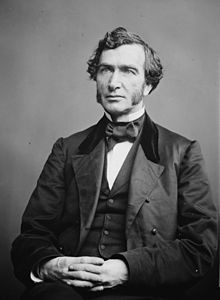Justin Smith Morrill
| Justin Smith Morrill | |
|---|---|
 |
|
|
United States Senator from Vermont |
|
|
In office March 4, 1867 – December 28, 1898 |
|
| Preceded by | Luke P. Poland |
| Succeeded by | Jonathan Ross |
| Chairman of the House Republican Conference | |
|
In office March 4, 1863 – March 3, 1867 |
|
| Preceded by | Inaugural holder |
| Succeeded by | Vacant |
| Chairman of the House Committee on Ways and Means | |
|
In office March 4, 1865 – March 3, 1867 |
|
| Preceded by | Thaddeus Stevens |
| Succeeded by | Robert C. Schenck |
| Member of the U.S. House of Representatives from Vermont's 2nd district |
|
|
In office March 4, 1855 – March 3, 1867 |
|
| Preceded by | Andrew Tracy |
| Succeeded by | Luke P. Poland |
| Personal details | |
| Born |
April 14, 1810 Strafford, Vermont, US |
| Died | December 28, 1898 (aged 88) Washington, D.C., US |
| Political party | Whig, Republican |
| Spouse(s) | Ruth Barrell Swan (1821–1898) |
| Profession | Businessman |
| Religion |
Universalist (Later Unitarian) |
| Signature | |
Justin Smith Morrill (April 14, 1810 – December 28, 1898) was a Representative (1855–1867) and a Senator (1867–1898) from Vermont, most widely remembered today for the Morrill Land-Grant Colleges Act that established federal funding for establishing many of the United States' public colleges and universities. He was one of the founders of the Republican Party.
Born in Strafford, Vermont, Morrill attended the common schools, Thetford Academy and Randolph Academy. He was trained for a business career by working as a merchant’s clerk in Strafford and Portland, Maine. He then was a merchant in Strafford, and the partnership in which he participated with Judge Jedediah H. Harris grew to own and operate four stores throughout the state. Morrill also served in local offices including Town Auditor and Justice of the Peace.
One of Judge Harris's daughters married Portus Baxter, who also served in Congress. Baxter and Morrill became close friends as a result of the connection to Judge Harris, with Morrill referring to Baxter as "one of nature's noblemen" and Baxter consciously patterning his business and political career on Morrill's.
Morrill invested in several successful ventures, including banks, railroads and real estate. By the late 1840s he was financially secure enough to retire, and he became a gentleman farmer.
In addition to farming, Morrill became active in the Whig Party, including serving as Chairman of the Orange County Whig Committee, a member of the Vermont State Whig Committee, and a Delegate to the 1852 Whig National Convention.
In 1854 Morrill was elected to the Thirty-fourth Congress as a Whig. He was a founder of the Republican Party, and won reelection five times as a Republican, serving from March 4, 1855 to March 3, 1867. He served as chairman of the Committee on Ways and Means in the Thirty-ninth Congress. He also served on the Joint Committee on Reconstruction, which drafted the Fourteenth Amendment to the United States Constitution.
...
Wikipedia
